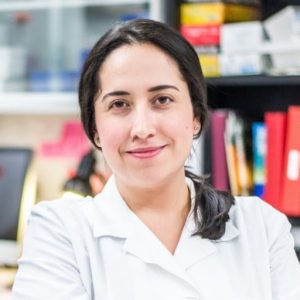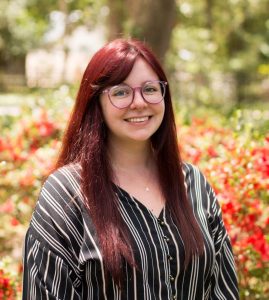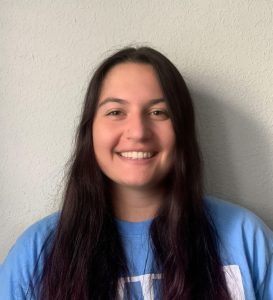Lab Members
Sarah Linnstaedt, PhD

Dr. Linnstaedt is an Associate Professor in the Department of Anesthesiology at the University of North Carolina at Chapel Hill (UNC-CH) and is an active member of the Institute for Trauma Recovery, the Genetics and Molecular Biology curriculum, and the Carolina Stress Institute. She received her BSc from Virginia Tech, her PhD from Georgetown University, and completed her postdoctoral fellowship at Duke University. Following training, she joined the faculty at UNC-CH and focused her career on understanding vulnerability factors for chronic pain and co-occurring adverse neuropsychiatric symptoms. Her lab is particularly interested in the role that molecular and genetic mechanisms play in posttraumatic chronic pain development. Dr. Linnstaedt enjoys collaborating with the fantastic team of scientists in her lab as well as with other labs at UNC-CH and across the globe.
Lauren A. McKibben, PhD
 Lauren completed her undergraduate degree in Psychology with a minor in Maths from Nicholls State University, Thibodaux, LA in 2015. Then she pursued PhD work in Behavioral Neuroscience under her mentor, Yogesh Dwivedi, at the University of Alabama at Birmingham. This work culminated with her dissertation in 2020 focused on miRNA mechanisms underlying early life stress induced susceptibility and resilience following environmental enrichment.
Lauren completed her undergraduate degree in Psychology with a minor in Maths from Nicholls State University, Thibodaux, LA in 2015. Then she pursued PhD work in Behavioral Neuroscience under her mentor, Yogesh Dwivedi, at the University of Alabama at Birmingham. This work culminated with her dissertation in 2020 focused on miRNA mechanisms underlying early life stress induced susceptibility and resilience following environmental enrichment.
Following her PhD, Lauren further pursued her interest in how physical and mental health are deeply intertwined. This led her to join the Linnstaedt lab in 2021 as a Postdoctoral Research Associate where she is studying epigenetic and molecular mechanisms of trauma-induced pain sensitivity. [Google Scholar]
What is your degree in?
I have a PhD in Psychology with a concentration in Behavioral Neuroscience.
What is your area of research with the Linnstaedt lab?
My primary focus is on the molecular aspects of our FKBP5 project. I also assist with cell and animal-based research for this project as well as others focused on miRNA-based gene regulation. I am currently developing ideas for my independent line of research.
What do you find most inspiring working in science?
Sometimes in science, I feel very small, like my contributions don’t really matter. Taking a step back and looking at our advancement in science over the past several decades (or even just 2020), it seems clear that it takes a village to get to where we are now. Even if we feel insignificant in our individual efforts, I feel pride in what we have achieved as a collective and even more excited and hopeful for what we will do in the future. It’s inspiring to think we have contributed to this in some way and maybe without our cogs, the machine might not turn as well or as fast.
What is your favorite music/podcast to listen to while at the bench?
This American Life, Radiolab, Stuff You Should Know are all great podcasts that allow me to continue learning about a multitude of interests while pursuing my science.
Liz Marie Albertorio-Saez, M.Sc.

Liz completed her undergraduate degree in Biology at the University of Puerto Rico Mayaguez. She then pursued a Master’s degree in Microbiology at the University of Rochester School of Medicine where she focused on the overlap between platelets and the immune system. Liz is particularly interested in the influence and contributions of the immune system in driving disease progression, particularly those related to autoimmunity and chronic pain.
What is your area of research with the Linnstaedt lab?
I utilize different technologies to measure and identify biomarkers that can predict post-traumatic adverse outcomes, particularly chronic pain that develops after a motor vehicle collision. I am currently measuring the circulating levels of pro- and anti-inflammatory cytokines (and other immune-related proteins) of patients throughout the long-term recovery process after a motor vehicle accident. Our goal is to identify biomarkers that could assist in the treatment, monitoring and recovery from a motor vehicle accident with a particular interest in preventing long-term complications.
What is your favorite book about science?
One of my (many) favorite books about science is “Fatal Invention: How Science, Politics, and Big Business Re-create Race in the Twenty-First Century” by Dr. Dorothy Roberts. The book looks at different ways on how different scientific fields created and reinforced the concept of biological race and continues to harm by justifying racial differences in outcomes that can be explained by racism.
Erica Branham
I am a PhD student in Genetics and Molecular Biology and I joined the Linnstaedt lab in Spring 2021! My interest in epigenetics as it relates to trauma exposure led me to join the team of passionate individuals working to understand and improve the trauma recovery process in the Linnstaedt lab.
am a PhD student in Genetics and Molecular Biology and I joined the Linnstaedt lab in Spring 2021! My interest in epigenetics as it relates to trauma exposure led me to join the team of passionate individuals working to understand and improve the trauma recovery process in the Linnstaedt lab.
What is your degree in?
B.S. Genetics from Texas A&M University
What is your area of research with the Linnstaedt lab?
My work in the lab focuses on understanding whether CpG methylation signatures within regulatory sequences of stress-response genes predict chronic pain development following traumatic stress exposure, and I am investigating how epigenetic regulation of these genes can contribute to post-traumatic chronic pain development.
What do you find most inspiring working in science?
I am amazed and inspired by the complexity of life on a molecular scale and the coordination between biological processes that is required for life! The more I learn about the molecular world working in science, I find it more and more incredible that my cells work together well enough to keep me alive every day, and that knowledge helps me keep life in perspective. I also believe that studying epigenetics as it relates to stress and trauma teaches compassion by understanding that an individual’s environment can have tangible biological consequences, so we might as well treat each other kindly.
What is your favorite book about science?
The Immortal Life of Henrietta Lacks by Rebecca Skloot
Esther Son
 Esther joined the Linnstaedt lab in 2018. Esther won the 2020 Best Poster awarded by UNC’s Center for Women’s Health Research, Peritraumatic Circulating 17β-Estradiol as a Resiliency Factor for Chronic Pain Outcomes in Women Following Trauma
Esther joined the Linnstaedt lab in 2018. Esther won the 2020 Best Poster awarded by UNC’s Center for Women’s Health Research, Peritraumatic Circulating 17β-Estradiol as a Resiliency Factor for Chronic Pain Outcomes in Women Following Trauma
What are you majoring in?
Neuroscience
What is your area of research with the Linnstaedt lab?
My research focus at the Linnstaedt Lab is measuring and identifying biomarkers that predict post-traumatic adverse neurobiological outcomes, such as chronic pain and stress, from human participants enrolled in various trauma cohorts. So far, I have been and am currently involved in projects that look primarily at the levels of sex hormones at the time of trauma, and their impact on post-traumatic chronic pain for those who have experienced sexual assault, motor vehicle collisions, and major thermal burn injuries.
What do you find most inspiring working in science?
I find it incredibly exciting that there will always be a void of knowledge that we will fill–we will never run out of things to research and to discover. Chronic pain and post-traumatic stress are fascinating areas of research and I love that no matter how small of a contribution, I can be a part of the journey to improving the lives of countless people through our research.
What is your favorite book about science?
This isn’t a book ABOUT science, but I really love the book, “The Spirit Catches You and You Fall Down,” by Anne Fadiman. It’s about the cultural clash in medicine between American doctors and a Hmong family. It is a must-read for anyone looking to pursue a career in medicine.
Who is one of your science heroes?
Darrion Nguyen! I am obsessed with his “lab shenanigans” videos; they absolutely hilarious yet so informative/ relatable.
What is your favorite music/podcast to listen to while at the bench?
I like catching up on the status of the world through news podcasts, like the NPR Code Switch, The Daily podcast by NYT, or the Wall Street Journal podcast…Or some pump-up rap. 😀
Leo Pang
 Leo joined the Lab in 2018.
Leo joined the Lab in 2018.
What are you majoring in?
Quantitative Biology and Neuroscience
What is your area of research with the Linnstaedt lab?
I’m working on a machine learning algorithm to identify predictors for PTSD and depression.
What do you find most inspiring working in science?
Working in science is especially interesting for me since I’ve always been curious in learning about how our world works. I find research extremely rewarding, as I’m applying science to real world problems to better understand our world and create a positive impact on society.
What is your favorite music/podcast to listen to while at the bench?
Gangster Capitalism
Favorite movie/tv show/fictional scientist?
Breaking Bad/Walter White
Ishani Deliwala
 Ishani joined the Linnstaedt lab in 2019. Ishani’s adaptable and can-do attitude has made them a valuable member of the team.
Ishani joined the Linnstaedt lab in 2019. Ishani’s adaptable and can-do attitude has made them a valuable member of the team.
What are you majoring in?
Psychology and Medical Anthropology!
What is your area of research with the Linnstaedt lab?
Currently, I am working on a project about how different chronic stressors interact with epigenetic changes in genes in the stress pathway (HPA Axis) to predict adult pain outcomes following single trauma exposure! I also spend a lot of time working on animal research. The most recent animal work I did was helping in a project to assess the efficacy of estrogen in reducing stress-induced hyperalgesia in rat models.
What do you find most inspiring working in science?
I like knowing that the work I am doing will be able to help people in the future!
What is your favorite book about science?
I don’t have a favorite book, but I love books by Atul Gawande!
Who is one of your science heroes?
Rosalind Franklin!
Favorite movie/tv show/fictional scientist?
Ms. Frizzle from The Magic School Bus!
Aaron Lee
 Aaron joined the Linnstaedt lab in 2019.
Aaron joined the Linnstaedt lab in 2019.
What are you majoring in?
Biomedical and Health Sciences Engineering
What is your area of research with the Linnstaedt lab?
Since coming to the lab, I have mainly focused on work with the human cohort data, and am currently working on finding a link between epigenetic changes and PTSD/chronic pain incidence in said human cohorts.
What do you find most inspiring working in science?
I like the fact that our work is both interesting but also has the potential to deliver tangible benefits to trauma survivors, who are probably the people who need it the most.
What is your favorite book about science?
I really liked the Jurassic Park series
Who is one of your science heroes?
Hamilton Morris
What is your favorite music/podcast to listen to while at the bench?
I like the Woj podcast about NBA basketball
Rhea Arora
 Rhea officially joined the Linnstaedt lab in 2020, although Rhea has been working with us since high school!
Rhea officially joined the Linnstaedt lab in 2020, although Rhea has been working with us since high school!
What are you majoring in?
Biology
What is your area of research with the Linnstaedt lab?
I am currently working with a small team on our sex differences project. We are focusing on the association between chronic pain and emergency contraception usage.
What do you find most inspiring working in science?
Science furthers our knowledge of why people suffer from illnesses and enables the development of medical treatments. I am most inspired by the opportunity to improve the lives of people who are suffering.
What is your favorite music/podcast to listen to while at the bench?
I love listening to slow pop and R&B while at the bench! My favorite artists are The Weeknd and Léon.
Favorite movie/tv show/fictional scientist?
My favorite fictional scientist is Dr. Emmett Brown from the Back to the Future movie series!
Sophia Kuhl-Chimera

Sophia joined the Linnstaedt lab in 2020.
What are you majoring in?
Biology and Psychology
What is your area of research with the Linnstaedt lab?
Since joining the lab, I have primarily worked with animal cohort data. I have most recently joined the FKBP5 project in which I am running RNA extractions from various tissues.
What do you find most inspiring working in science?
Working in science, I am most inspired by the collaboration among fellow researchers. As competitive of a field, it is nice to experience overwhelming support from the community.
What is your favorite music/podcast to listen to while at the bench?
I enjoy listening to alternative rock while at the bench. My favorite artists are AJR and Twenty One Pilots!
Tina Lin

Tina joined the Linnstaedt lab in 2019.
What are you majoring in?
Biostatistics and Biology
What is your area of research with the Linnstaedt lab?
Currently, I am working on a project that uses machine learning to identify predictive variables of post-traumatic stress symptoms in people who have experienced motor vehicle collision.
What do you find most inspiring working in science?
I am intrigued by how our bodies function and react to different situations such as trauma. I am inspired by how powerful our work is and its potential to become a clinical tool that can impact and help the lives of many trauma survivors.
What is your favorite music/podcast to listen to while at the bench?
I enjoy listening to slow and sentimental original soundtracks from shows or movies that I have watched, oftentimes the instrumental version, as it is calming and helps me focus.
Favorite movie/tv show/fictional scientist?
My favorite tv show is a variety game show called Running Man.
Jacqueline Mickelson- Animal Specialist
Former Lab Members:
Britannia Wanstrath, B.A.

Brit came to UNC in 2015, and joined the Linnstaedt lab in 2018.
What is your degree in?
Pre-professional zoology
What is your area of research with the Linnstaedt lab?
I am studying how FKBP5 relates to post-trauma pain. I am also involved in the study of estrogen administration to prevent the development of pain post-trauma.
What do you find most inspiring working in science?
I have always been passionate about how animals and humans can work with each other. Our research involves looking for patterns in human data, testing those patterns with animals, and then bringing what we learn back to human treatments. The work we do may directly benefit humans, but animals can also benefit from these treatments. Through our work to improve the lives of our patients, we are also exploring how animals process stress, leading to better care for our furry friends. I am so proud of my part in our lab, and our dedication to compassion in research!
What is your favorite book about science?
I love everything Mary Roach, particularly Stiff and Gulp.
Jarred Lobo, B.S., B.A.
 Jarred joined the Linnstaedt lab in 2018. After graduating from UNC in 2020, Jarred came back to the lab as a research technician.
Jarred joined the Linnstaedt lab in 2018. After graduating from UNC in 2020, Jarred came back to the lab as a research technician.
What is your degree in?
Neuroscience and Public Policy
What is your area of research with the Linnstaedt lab?
I study the interplay of genetic and socio-environmental factors on posttraumatic adverse outcomes and the biological mechanisms driving chronic pain development following trauma exposure in women.
What do you find most inspiring working in science?
My work contributes to the future of precision medicine which would allow doctors to select interventions that are most likely to be effective in preventing or treating posttraumatic adverse outcomes in a specific patient based on their individual genes, environment, and lifestyle.